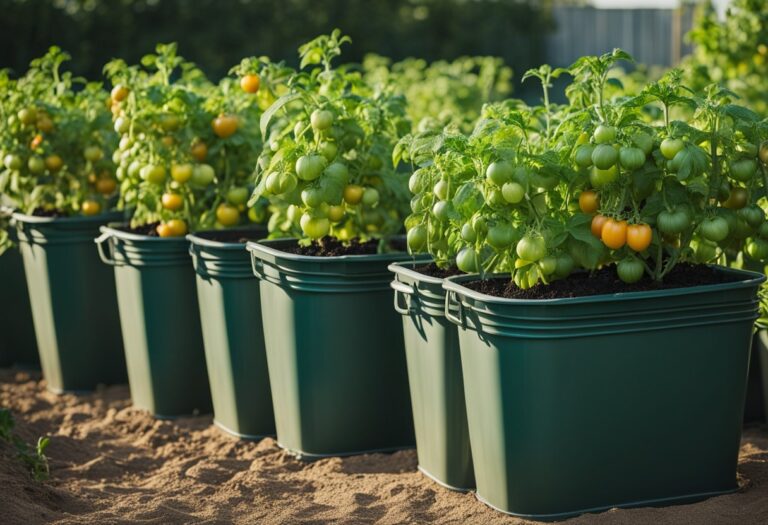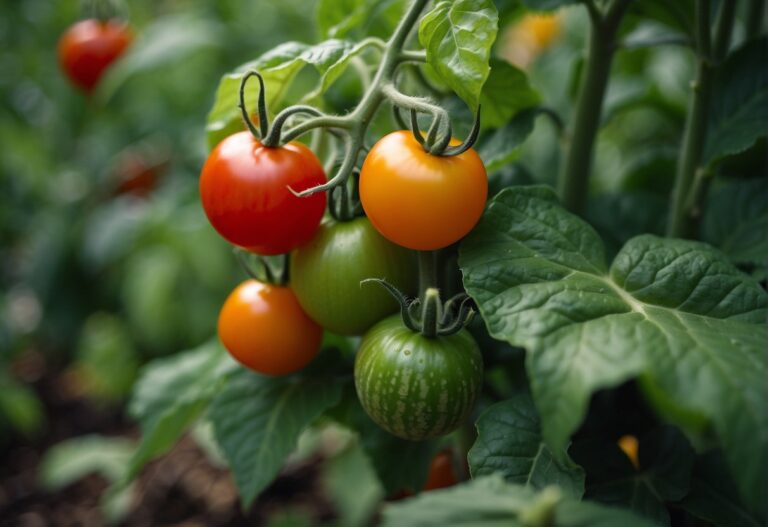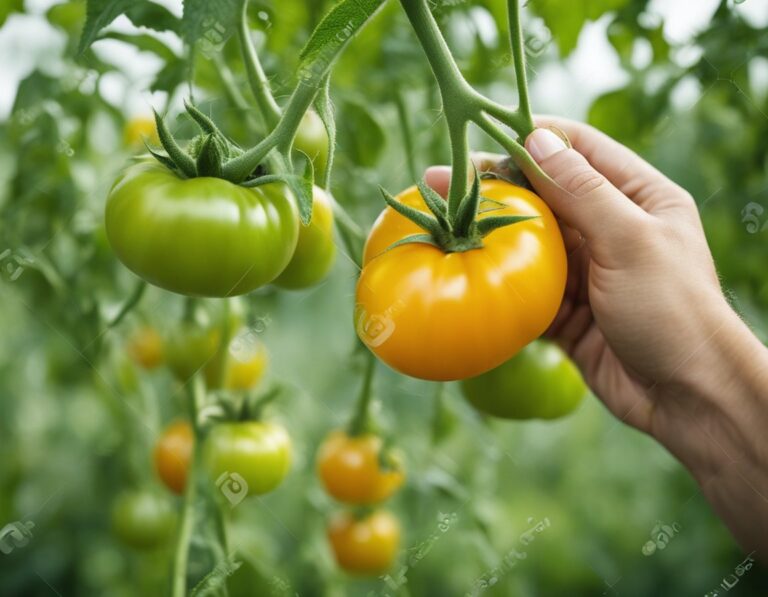Can You Spray Neem Oil on Tomato Plants? A Friendly Guide
If you’re a tomato gardener, you know that pests and diseases can wreak havoc on your plants. Fortunately, there are many natural remedies that can help protect your tomato plants.
One of the most popular natural remedies is neem oil. But can you spray neem oil on tomato plants? The answer is yes, neem oil is a safe and effective way to control pests and diseases on your tomato plants.
Neem oil is a natural insecticide and fungicide that is derived from the seeds of the neem tree. It works by disrupting the life cycle of pests and diseases, preventing them from reproducing and spreading.
Neem oil is safe for humans, pets, and beneficial insects, making it an ideal choice for organic gardeners. It can be used to control a wide range of pests and diseases, including aphids, whiteflies, spider mites, and powdery mildew.
If you’re considering using neem oil on your tomato plants, it’s important to know how to apply it correctly. In the next section, we’ll discuss the benefits of neem oil for tomato plants, how to apply it, and potential risks and precautions to keep in mind.
Key Takeaways
- Neem oil is a natural insecticide and fungicide that is safe for humans, pets, and beneficial insects.
- Neem oil can be used to control a wide range of pests and diseases on tomato plants.
- When applying neem oil, it’s important to follow the instructions carefully and take necessary precautions.
Can You Spray Neem Oil on Tomato Plants
If you’re looking for a natural way to control pests and diseases on your tomato plants, neem oil could be a good option. But can you spray neem oil on tomato plants? The answer is yes, you can. Neem oil is safe to use on tomato plants and is effective against a wide range of pests and diseases.
Neem oil is derived from the seeds of the neem tree, which is native to India. It has been used for centuries as a natural pesticide and is now widely available in the United States. Neem oil contains compounds that repel and kill pests, as well as compounds that boost the plant’s immune system and help it fight off diseases.
When using neem oil on tomato plants, there are a few things to keep in mind. First, it’s important to use a high-quality neem oil that is cold-pressed and unrefined. This will ensure that the oil contains all of the beneficial compounds that are naturally present in the neem seed.
Second, it’s important to follow the manufacturer’s instructions when applying neem oil to your tomato plants. Neem oil can be applied as a foliar spray or a soil drench, and the frequency of application will depend on the severity of the pest or disease problem.
Here are some tips for using neem oil on tomato plants:
- Neem oil is most effective when used preventatively, before pest or disease problems arise.
- Neem oil should be applied in the early morning or late evening, when temperatures are cooler and the sun is not as strong. This will prevent the leaves from burning.
- Neem oil should be applied to both the tops and bottoms of the tomato leaves, as well as the stems and the soil around the plants.
- Neem oil should not be used in combination with other pesticides or fungicides, as this can cause damage to the plant.
- Neem oil should be stored in a cool, dry place, away from direct sunlight.
Benefits of Neem Oil for Tomato Plants
If you’re wondering whether you should use neem oil on your tomato plants, the answer is yes! Neem oil is a natural and effective way to keep pests and diseases away from your tomato plants. Here are some benefits of using neem oil on tomato plants:
1. Natural Pest Control
Neem oil is a natural insecticide that can help control pests that damage tomato plants. It works by disrupting the insect’s hormonal balance, making it difficult for them to feed, breed, and lay eggs.
Some of the pests that neem oil can control include aphids, spider mites, whiteflies, and tomato hornworms.
2. Fungal Disease Prevention
Tomato plants are susceptible to various fungal diseases such as powdery mildew, anthracnose, and septoria leaf spot.
Neem oil has antifungal properties that can help prevent these diseases from affecting your tomato plants. Applying neem oil to your tomato plants can create a protective barrier that prevents fungal spores from germinating.
3. Safe for You and the Environment
Neem oil is a safe and eco-friendly alternative to chemical pesticides. It doesn’t harm beneficial insects such as bees and ladybugs, and it’s safe for humans and pets.
However, it’s important to follow the instructions on the label and avoid spraying neem oil when bees are present.
4. Easy to Use
Using neem oil on tomato plants is easy and straightforward. You can apply it as a foliar spray or a soil drench.
Simply mix the neem oil with water according to the instructions on the label and spray it on the leaves and stems of your tomato plants. Alternatively, you can mix neem oil with water and pour it around the base of your tomato plants.
5. Affordable
Neem oil is an affordable way to protect your tomato plants from pests and diseases. A small bottle of neem oil can go a long way, and it’s much cheaper than buying chemical pesticides. Plus, neem oil is a natural and sustainable solution that won’t harm the environment.
Overall, using neem oil on your tomato plants is a great way to keep them healthy and thriving. It’s a natural and effective solution that can help control pests and prevent fungal diseases. Plus, it’s safe for you and the environment, easy to use, and affordable.
How to Apply Neem Oil on Tomato Plants
If you are looking for a natural and effective way to protect your tomato plants from pests and diseases, neem oil can be a great option. Here are some tips on how to apply neem oil on tomato plants to get the best results.
Preparation of Neem Oil Spray
Before you start spraying neem oil on your tomato plants, you need to prepare the neem oil spray.
You can either buy a pre-made neem oil spray or make your own by mixing neem oil concentrate with water and a few drops of dish soap.
To make your own neem oil spray, follow these steps:
- Purchase a cold-pressed neem oil concentrate from a reputable supplier.
- Mix 1 tablespoon of neem oil concentrate with 1 quart of warm water in a spray bottle.
- Add a few drops of dish soap to the mixture to help the neem oil stick to the plant leaves.
- Shake the spray bottle well to mix the ingredients thoroughly.
Best Time to Spray Neem Oil
The best time to spray neem oil on your tomato plants is in the early morning or late evening when the temperature is cooler and the sun is not too strong.
This will help prevent the neem oil from evaporating too quickly and ensure that it has enough time to penetrate the plant leaves.
Here are some other tips to keep in mind when spraying neem oil on your tomato plants:
- Spray the neem oil on both sides of the plant leaves to ensure full coverage.
- Avoid spraying the neem oil on the flowers or buds, as this can affect pollination.
- Repeat the neem oil spray every 7-10 days or as needed, especially if you notice any signs of pests or diseases on your tomato plants.
By following these tips, you can use neem oil to protect your tomato plants from pests and diseases naturally and effectively.
Potential Risks and Precautions
When using neem oil on tomato plants, it is important to take certain precautions to avoid any potential risks. Here are some things to keep in mind:
Effects on Beneficial Insects
While neem oil is generally considered safe for humans and animals, it can have negative effects on beneficial insects, such as bees and ladybugs.
Be sure to apply neem oil early in the morning or late in the evening when these insects are less active. Additionally, avoid spraying neem oil on blooming plants or flowers, as this can harm pollinators.
If you are concerned about the impact of neem oil on beneficial insects, consider using an alternative natural pesticide or consulting with a professional.
Proper Storage and Disposal
Neem oil should be stored in a cool, dry place away from direct sunlight. It should not be stored in areas where it may be exposed to high temperatures or moisture, as this can reduce its effectiveness.
Additionally, neem oil should be kept out of reach of children and pets. When disposing of neem oil, be sure to follow the instructions on the label carefully.
Do not pour neem oil down the drain or into bodies of water, as this can harm aquatic life. Instead, dispose of neem oil in accordance with local regulations or consult with a professional.
Alternatives to Neem Oil for Tomato Plants
If you are looking for alternatives to neem oil for your tomato plants, there are a few options available. Here are some natural alternatives to consider:
1. Garlic Spray
Garlic spray is an excellent natural insecticide that works well against aphids, spider mites, and other pests that can damage your tomato plants. To make garlic spray, you will need to crush a few cloves of garlic and mix them with water.
Allow the mixture to steep for a few hours, then strain it and add it to a spray bottle. Spray the mixture on your tomato plants, making sure to cover both the leaves and stems.
2. Essential Oils
Essential oils such as peppermint, rosemary, and clove can be used to make a natural insecticide that is effective against a wide range of pests.
To make the spray, mix a few drops of essential oil with water and add it to a spray bottle. Spray the mixture on your tomato plants every few days to keep pests at bay.
3. Soap Spray
A soap spray is an effective way to control pests such as aphids and spider mites. To make the spray, mix a few drops of liquid soap with water and add it to a spray bottle.
Spray the mixture on your tomato plants, making sure to cover both the leaves and stems. Be sure to rinse the plants with water after a few hours to avoid any damage to the leaves.
4. Diatomaceous Earth
Diatomaceous earth is a natural powder made from the fossilized remains of tiny marine organisms. It is an effective insecticide that works by dehydrating pests such as aphids and spider mites.
To use diatomaceous earth, sprinkle a small amount on your tomato plants, making sure to cover both the leaves and stems. Reapply the powder after a few days to keep pests at bay.
5. Companion Planting
Companion planting is a natural way to control pests and improve the health of your tomato plants.
Planting herbs such as basil, mint, and rosemary around your tomato plants can help repel pests and improve the flavor of your tomatoes. Additionally, planting marigolds around your tomato plants can help deter pests such as nematodes.
Frequently Asked Questions
How do you apply neem oil to tomato plants?
When applying neem oil to tomato plants, it’s important to follow the instructions on the label. Typically, you’ll mix the neem oil with water and apply it as a foliar spray using a garden sprayer or spray bottle.
Be sure to cover the entire plant, including the undersides of the leaves. You can also use neem oil as a soil drench by mixing it with water and pouring it around the base of the plant.
Can I use neem oil on pepper plants?
Yes, neem oil can be used on pepper plants as well as other vegetable plants. It’s important to follow the instructions on the label and to test the neem oil on a small area of the plant before applying it to the entire plant.
Can I use neem oil on all plants?
While neem oil is generally safe to use on most plants, there are some plants that may be sensitive to it.
These include plants in the Solanaceae family, such as eggplants and peppers, as well as some ornamental plants. It’s always a good idea to test the neem oil on a small area of the plant before applying it to the entire plant.
What is the best thing to spray on tomato plants?
In addition to neem oil, there are a number of other products that can be used to control pests and diseases on tomato plants.
These include insecticidal soaps, horticultural oils, and natural remedies such as garlic spray and hot pepper spray. It’s important to choose a product that is safe for use on edible plants and to follow the instructions on the label.
What plants should you not use neem oil on?
While neem oil is generally safe to use on most plants, there are some plants that may be sensitive to it.
These include plants in the Solanaceae family, such as eggplants and peppers, as well as some ornamental plants. It’s always a good idea to test the neem oil on a small area of the plant before applying it to the entire plant.
Can you spray neem oil directly on vegetables?
Yes, neem oil can be sprayed directly on vegetables. However, it’s important to follow the instructions on the label and to wash the vegetables thoroughly before eating them.
It’s also a good idea to test the neem oil on a small area of the plant before applying it to the entire plant.




